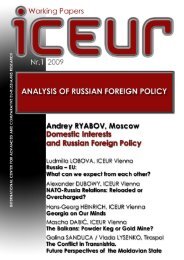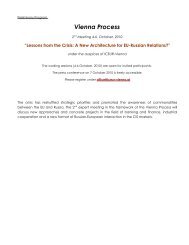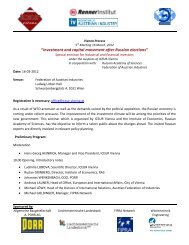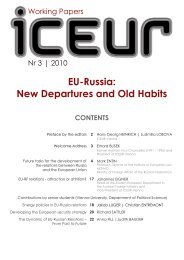Address - International Center for Advanced and Comparative EU ...
Address - International Center for Advanced and Comparative EU ...
Address - International Center for Advanced and Comparative EU ...
Create successful ePaper yourself
Turn your PDF publications into a flip-book with our unique Google optimized e-Paper software.
Alex<strong>and</strong>er DYNKIN<br />
Global Turmoil: Challenges <strong>for</strong> Russia<br />
billion rbl.<br />
300.00<br />
280.00<br />
260.00<br />
240.00<br />
220.00<br />
200.00<br />
180.00<br />
160.00<br />
140.00<br />
120.00<br />
100.00<br />
80.00<br />
60.00<br />
40.00<br />
20.00<br />
0.00<br />
Central Bank credits (except overnight),<br />
billion RUR<br />
2008 Januar<br />
Februar<br />
March<br />
April<br />
May<br />
June<br />
July<br />
August<br />
September<br />
October<br />
November<br />
December<br />
2009 January<br />
Februar<br />
March<br />
April<br />
May<br />
June<br />
July<br />
Graph 3<br />
up” along this way. Among the sustainable <strong>and</strong> big developed economies only one increased the national<br />
bank interest rate, namely Norway (though by a split-fraction percentage point <strong>and</strong> no earlier than by the end<br />
of October 2009).<br />
The logic of such an approach is simple. The increase of the interest rate restrains inflation <strong>and</strong> – by making<br />
credit more expensive <strong>and</strong> less available – impedes capital flight.<br />
But simultaneously, such a policy deals the economy a heavy blow, limiting the increase of goods <strong>and</strong><br />
services supply. The limitation of supply naturally aggravates the problem of inflation, which remains the<br />
most important indicator targeted by the Ministry of Finance.<br />
Our economy did not manage to diversify. Against this background <strong>and</strong> taking into account the fact that<br />
during the years of “oil <strong>and</strong> gas prosperity”, households accumulated certain savings. In Russia, we<br />
nevertheless see effective dem<strong>and</strong>, which is oriented towards imported goods. Still, in the Ist quarter of<br />
2009, compared to the Ist quarter of 2008, the import of plasma TV sets decreased by 75%, <strong>and</strong> the import of<br />
cars by 34%. The fall of world energy prices caused the devaluation of the ruble. At the same time, more<br />
expensive imports put additional pressure on the ruble exchange rate.<br />
As a result, in Russia unlike in the majority of the other G-20 countries, which suffered deflationary pressure<br />
in the economy, the crisis caused stagflation, meaning the rise of prices along with the fall of production. The<br />
combination of the abovementioned factors provides grounds <strong>for</strong> the assumption that the period of<br />
stagflation in Russian economy will last <strong>for</strong> a minimum of two more years.<br />
Unlike many other countries, Russia accumulated large <strong>for</strong>eign currency reserves, which now are a main<br />
source of financing anti-crisis measures. The bulk of anti-crisis financial support was channeled into the<br />
banking system in order to overcome the domestic credit crunch. The result was not encouraging. in<br />
comparison with many other countries. The banks prefer to buy dollars <strong>and</strong> Euros <strong>and</strong> transfer them abroad<br />
instead of crediting the real sector of economy. In a situation where the ruble devaluates, the non-financial<br />
sector companies, as well as households, save their assets, avoiding the falling ruble <strong>and</strong> a two-digit dollar<br />
inflation. In general, a bi-currency mentality is typical <strong>for</strong> the majority of economic agents, companies <strong>and</strong><br />
households.<br />
Simultaneously, support is extended to the producers. Some production taxes were reduced. Credit was<br />
extended to large companies (mainly in the energy <strong>and</strong> metallurgy sectors) with big <strong>for</strong>eign exchange<br />
denominated debts. Selective financial support is in progress to approximately 300 enterprises, whose<br />
IC<strong>EU</strong>R-Vienna Working Papers 2|2009 11









